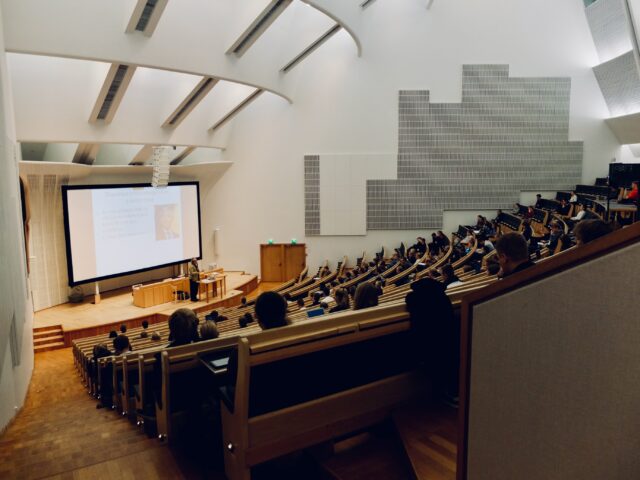After three decades of collaboration, the partnership between Vancouver Island University and ElderCollege has come to an end. The VIU ElderCollege collaboration provided adults ages 50 and up with continuing education programs, with the university providing accounting services and classroom space for the organization’sprograms. VIU noted in a statement that the partnership “has been a source of pride for both parties over the past 30 years,” but noted financial considerations in its choice to end it. Students who are currently enrolled in VIU ElderCollege will be able to finish their courses this fall; the university added that it will examine new continuing education models aimed at meeting the needs of learners of all ages. ElderCollege board chair Ross Peterson said that the organization is optimistic that it can find a way to continue providing courses in the future.

Top Ten News
October 4, 2023
The Fédération des cégeps has launched an advertising campaign and website to highlight the full range of training opportunities available through the Québec college network. The campaign–titled “Le cégep, ça ouvre des portes”–includes a 30-second video that showcases the various future pathways available to students who attend a cégep. The video will be played on various television channels and digital media networks and will be accompanied by social media banners. The new website provides a user-friendly experience for prospective students who want to browse cégep program offerings. Fédération des cégeps président Bernard Tremblay explained that both the website and campaign aim to demonstrate that the college network can “open doors” for young people and adults.
Mount Royal University and the Łútsël K’é Dene First Nation have signed a five-year practicum agreement. Students in MRU’s Faculty of Health, Community and Education will be able to travel to the Łútsël K’é community in the Northwest Territories for practicum placements, where they will create, design, and implement recreation programs. Further work under the agreement will be conducted to determine if similar opportunities can be organized for MRU students from other programs. “This partnership that we are creating is for the greater community and I think we are going to see a great benefit for our youth,” said Łútsël K’é Dene First Nation Chief James Marlowe. “Practicum students who choose to come here will benefit too as they experience our culture and our way of living.”
In an op-ed for Inside Higher Ed, Robert Robbach, Kendra Sewall, and Stefanie Robel outline the benefits of implementing a 32-hour workweek for academic researchers. They question the assumption that working more hours results in increased successful output and reference several recent studies that have demonstrated the negative impacts associated with working long hours. The authors argue that academia should instead prioritize efficiency over the number of hours clocked and set realistic expectations about the amount of work a team can deliver. The writers maintain that this could help careers in academia become more desirable, fulfilling, and sustainable.
Keyano College and Portage College have received investments from the Government of Alberta for facility upgrades and programming support. Keyano has received a total of $9.2M to create 93 new seats in its nursing and primary care paramedic programs, support apprenticeship programs, and replace campus HVAC air handling units. The Edmonton Journal reports that provincial and community leaders have expressed hope that the funding will help to keep young people in their community. Portage has received $2.1M to create 96 paramedicine program seats, support apprenticeship programs, and modernize classrooms and improve student learning experiences.
Thompson Rivers University’s Board of Governors has unanimously approved the construction of a $22M Indigenous Education Centre. The centre will be located near the centre of TRU’s Kamloops campus and will provide a space for Indigenous students, ceremonies, culture, and scholarly work. Designs for the building–developed by Stantec and Indigenous architect Patrick Stewart–are based on the Secwépemc structural design for meeting houses. “TRU is committed to Truth and Reconciliation, and the Indigenous Education Centre will provide an inclusive and supportive environment for Indigenous learners, faculty and staff,” said TRU President Brett Fairbairn. Construction on the centre will begin in Spring 2024.
Liisa Postareff (Häme University of Applied Sciences), Juulia Lahdenperä (Häme), Telle Hailikari (Häme), and Anna Parpala (University of Helsinki) have published a study on approaches to teaching and the validity of the Higher Education Approaches to Teaching (HEAT) inventory. The HEAT inventory captures four dimensions identified in teaching approaches: interactivity, information transmission, reflectivity, and organized teaching. In addition to these, the researchers also examined the impact of teachers’ self-efficacy. The authors state that their analysis confirmed that HEAT “is a robust instrument” and discuss the relationships they found between the different dimensions and self-efficacy.
Several large, unsanctioned student parties have appeared in the neighbourhoods near campuses over the last few weeks, in some instances sparking calls for action from the local communities. Residents from 14 households near Dalhousie University issued an open letter asking for a public meeting with the mayor, the police chief, and Dal’s president after a major street party. and both report arrests, tickets, and hospital visits that resulted from unofficial gatherings near McMaster University and Western University, which each drew “thousands” of students and partiers. In Ottawa, Carleton University and the University of Ottawa co-hosted “PandaFest,” an official tailgate party that was held after the annual Panda Game. Moving the game to earlier in the day and creating an official post-game party reportedly helped to reduce the amount of unofficial partying surrounding the annual game.
A stream of new technologies–including, most recently, artificial intelligence (AI)–has led to the devaluation of writing skills for both students and teachers alike, writes Naomi S Baron (American University) for the . Baron contends that the advent of ChatGPT has led to a “tipping point” in academia and that it is now more important than ever for teachers to reestablish the importance of writing to their students. Baron maintains that instructors across all disciplines should demonstrate to students that writing is “a process, not just a product” and that it can be a meaningful cognitive tool for discovery and critical thinking.
Redeemer University recently celebrated the opening of its Innovation Centre, a new space for students to think creatively and launch their entrepreneurial ventures. The Innovation Centre features open-concept offices, collaborative areas, and a makerspace fitted with state-of-the-art technology. It is located near the university’s Career Centre and will also provide opportunities for students to network with local businesses and non-profit organizations. “The Innovation Centre is an exciting addition to Redeemer’s academic program that will prepare students to think in innovative and entrepreneurial ways about challenges and opportunities,” said Redeemer President Dr David Zietsma.
